- Home
- Patricia MacLachlan
Unclaimed Treasures Page 5
Unclaimed Treasures Read online
Page 5
“Here.” Willa looked up as Matthew reached around her back, his breath soft on her cheek as he adjusted her arm. “Lean your arm along the windowsill, Willa. Pretend it is the lowest limb of the apple tree. Covered with blooms.”
As Matthew leaned back to smile at Willa she suddenly knew what was wrong. She could still feel where he had touched her arm. Where his breath had brushed her cheek. She looked over to the mirror.
Under this dress is me. One small person. Not tall, not stately. Willa Pinkerton.
“Tilt your head, please. Look at me,” said Matthew. “Ah, good.”
Good. In her head Willa repeated Matthew’s words. Like Bella repeating Old Pepper’s words.
“Nice, nice, Willa,” Matthew called to her from behind the easel.
Nice, Willa.
The minutes went by. The dress scratched against her legs, but Willa didn’t move.
“Smile a bit, Willa. Just a little. As if . . . as if you have a secret.”
Smile a bit, Willa. I do have a secret.
Willa smiled and smiled and smiled as the light moved higher in the sky. The room was filled with silence, and Willa closed her eyes. Where are you, Ted? Wanda? Willa thought of the baby—real and moving inside her mother. Hidden, like Willa under the dress.
“Turn your head, Willa. Look at me.”
I love you, thought Willa. She turned and opened her eyes, watching Matthew. I love you.
Matthew rubbed his face with the back of his hand. Willa looked at herself in the mirror.
One question, please, Horace’s father. Who will the figure in the painting be? The girl in the mirror? Or the girl under the dress?
The eyes of the girl in the mirror stared blankly back at Willa. There was no answer.
The moon came in the window. It touched the covers on Willa’s bed, making it into a sea. The mirror over Willa’s table glowed. Willa’s feet hurt. She got up, sighing, and walked out into the hall. The house was quiet, only a small light burning above the stairs. She stood in the hallway, curling her bare feet on the rug, thinking about the studio and the dress. And sitting. Sitting? Willa hadn’t sat at all. She’d stood for hours. Stood in the silence until the backs of her legs were stretched and tight, her shins ached, and her head reeled. Why did they call it sitting? Willa walked down the stairs, her hand gliding along the banister. She passed through the dining room, where the bouquet of flowers stood in the moonlight, past the hum of the kitchen. The door of her father’s study was open, a lamp lit inside. Willa pushed the door open with one finger. Her mother was sitting in the wing chair, reading, her feet curled under her. She was smiling slightly, slowly twisting a lock of hair in her finger. She looked happy. No, not happy. Not joyous, certainly. But content.
Her mother looked up.
“Willa? Not sleeping?”
Willa shook her head, touching her mother’s outstretched hand. She sat on her father’s desk chair.
Her mother sighed. “I can’t sleep either.” She looked at Willa. “Too fat to sleep.”
Willa grinned and her mother grinned back.
“Willa,” her mother began, “about the other night. My crying.”
Willa pushed her hair behind her ears and sat, listening.
“I didn’t mean to worry you. Having a baby is such an important thing. So important that sometimes I try to forget about it—push it away. But it always comes back.” Her mother took something from between the pages of the book she was reading. “And this brought it all back.”
It was the picture of the baby.
“Most times the baby seems so far away,” her mother said. “Not really there, you know. But the picture . . .”
“Made it real,” said Willa. Like seeds and roots and night crawlers, she thought. Like Nicholas’s picture of the garden.
“Why, Willa,” said her mother, staring at her. “I guess you’re right.” And Willa realized that she had spoken her thought out loud.
“I never thought about you much before you were born, you and Nicholas,” said her mother, leaning her head against the back of the chair. “But when you came I was so overjoyed. I can remember crying.”
“Overjoyed?” Willa sat up. “You mean joyous?”
“Yes, Willa,” said her mother, smiling. “Joyous.”
“Even though we kept you from your dancing?”
“Dancing? Willa, what are you talking about?”
“You said you didn’t dance anymore after we were born. Remember?”
Willa’s mother leaned forward in her chair.
“But Willa, that was my choice. I didn’t want to dance then. I had you and Nicholas. I was . . .” Her mother waved her hand, trying to find the words. “I was . . . joyous.”
Willa frowned. So much joy over two small babies? Just Willa? Just Nicholas?
“Mama?”
“Yes.”
“When this baby comes I can take care of it sometimes, can’t I?”
“Of course, Willa.”
“Then you can dance,” said Willa.
Willa’s mother looked at her for a long time. Her eyes filled up.
Please God, thought Willa, don’t let her cry. Please. I’ll vacuum the living room. The study. The backyard!
“That is a wonderful idea,” said her mother very steadily. “A gift.”
Her mother handed her the picture of the baby.
“Now I’ll give you a gift. Meet your sister, Willa.”
Willa looked at the picture.
“Sister? Maybe it will be a brother.”
Her mother shook her head. “No, I know. The doctors and your father and I know. Because of a test. It is a girl. And”—she looked at Willa—“she will be . . . she is your sister.”
Upstairs the door to Nicholas’s room was open, a slice of moonlight cutting across the hallway. Willa stood over him, watching his chest rise and fall. The bedcovers were neat and smooth around him. His lips were slightly parted in a smile. The room was cool, the curtains billowing, and Willa hopped from one foot to the other. She hugged herself and shivered, wishing him awake. She coughed loudly. She leaned against the bed and pushed the mattress three times. Nicholas didn’t move.
For a long time Willa stood there, watching. For a long time she thought about kissing him.
She didn’t.
“Wake up, Nicholas!” she yelled at the top of her voice, nearly overcome with joy. “We’ve got us a sister!”
9
I love you, Matthew.
It was early in the studio, and through the open windows Willa could hear the Unclaimed Treasures playing near the garden. The cats were on the roof peering in and making growlings; soft, warm sounds.
“When can I see the painting?” asked Willa.
“Later,” murmured Matthew. “Not yet.”
“Why don’t you just take a photograph?” Willa surprised herself with the question. Her voice sounded loud in the studio quiet.
“What, Willa?” Matthew was frowning, his hands making quick brush strokes on the canvas. “What?”
“A photograph. Why do you need me here?”
“A photograph,” mumbled Matthew, concentrating. “A photograph,” he said brightly as he stood up. He thought.
“Wanda, Wanda, stand with the sun in your face,” said Ted with adoration in his voice, a camera in his hand, and well-pressed pants.
“A photograph,” said Matthew, interrupting Willa’s thoughts, “is the camera’s eye. I need my eye. My eye of you.”
Willa frowned.
“Don’t wrinkle your forehead,” said Matthew.
Willa concentrated on not frowning. It made her stomach hurt.
“What is your eye?” asked Willa, thinking fiercely of a smooth forehead.
“I don’t know yet,” said Matthew, peering at his painting, then at her.
“Don’t know!” Willa stared at him. “You mean you don’t know what I look like?”
Matthew sighed and straightened.
“I mean,” he said in
a fierce tone of his own, “that I cannot tell now how the painting will look. It may not look the way you think you look. The way I think you look. There are,” he added more softly, “many things that get in the way between the time a painting is started and it is finished.”
“Like what?”
Matthew picked up a cloth and wiped his hands. “Feelings, moods. Things hidden.”
“You mean things under the surface!” announced Willa so loudly that Matthew burst out laughing. “My life is full of things under the surface!” She scratched her leg. The material of the dress was irritating.
“It is the same for all of us.” said Matthew, stretching, then wearily rubbing his own tired back.
He is, I suppose, thinking about Winnie gone to seek her fortune, thought Willa.
“Weary Wanda,” murmured Ted, “let me rub your weary Wanda back.”
“Higher, Ted,” said Wanda, sipping her iced seltzer.
“Someone should rub your back,” said Willa, startling herself with the suggestion. She felt her face flush with embarrassment.
But Matthew was not shocked.
“Someone should, you are so very right, Willa,” he said.
“Someone will soon,” said Willa, feeling bold and warm and in love.
And as it turned out, Willa was right.
“A girl!” Horace Morris was amazed when Willa and Nicholas told him about the baby. He stretched his legs out over the curbstone. “That’s something, isn’t it? I mean, knowing.” He peered at Willa, who smiled at him.
“We got girls at our house,” said Porky, sucking his Popsicle.
“All over the place,” agreed Old Pepper. “You could have one if you wanted. No one would notice.”
“Have you got sisters?” asked Nicholas.
Old Pepper nodded. “Enough. Seven of them. I was nearly lost and drowning in stockings and underwear and curling irons, too, when I was young.” He squinted his eyes and peered at the roof across the street. “Parrots are better,” he said, watching Bella-Marie strut across the roof of the house. “She lives in her clothes. We’d all be better off if we did the same.”
Willa thought about the long white dress, about living in it, being forever tall and stately and beautiful. Fit for a painter’s brush. Fit for the painter. And suddenly the thought of the painting being completed struck her with such a force that she felt chilled. Just as, every so often, the thought of her own death would make her stop, breathless, until she could will the thought away. No more mornings in the studio. Just Matthew and Willa. In the sun-filled room.
Nicholas leaned over and touched her shoulder.
“Willa? What’s wrong?”
Willa looked up at him, sitting beside her on the curbstone. Looking up? It came to her just as suddenly as the thoughts of death and the finished painting. She was looking up at him.
“You are,” said Willa wearily, “taller than I am. For the first time, ever. When,” she whispered sadly, leaning toward Nicholas, “did that happen?”
Nicholas, seeing her face, didn’t speak. He let her lean on him. And they all watched Bella-Marie, touched by the sunlight, move back and forth across the roof, dressed in her own eternal clothing.
It was Old Pepper at last, Old Pepper and Nicholas talking in their wise ways about change and dying—in the most matter-of-fact manner—that made Willa decide to do something extraordinary. It had never seemed so important as when she listened to them talk.
“I will die before Bella-Marie,” mused Old Pepper, sitting out near the garden, wheelbarrow close by, Bella bumping around the yard. “Certainly I will.”
“No,” said Willa loudly. Bella-Marie looked up.
“Ah, Willa,” said Old Pepper gently, “it’s all right, child. It is, after all, my life. I don’t mind.”
I don’t mind. Such a mild answer, she thought, when faced with the prospect of dying.
“Bella’s a parrot, they’re long-lived,” he said.
And he and Nicholas talked softly, their heads close together, deciding Bella’s fate while Willa agonized over Old Pepper’s dying, and Bella’s and her mother’s and father’s, and the Unclaimed Treasures’ and Horace’s and Nicholas’s and Matthew’s—and at long last the worst death—hers.
“I myself,” stated Nicholas, his voice clear, “wish to be buried standing up. I hate to lie down.”
Willa’s eyes widened, and in spite of herself, she burst into laughter. Remembering that when they shared a room it was always Nicholas who went to bed sitting up. It was she who welcomed nighttime, closing her eyes with secret thoughts when the lights went out. It was the thump of Nicholas in the upper bunk, falling over at last from his upright vigil, that signaled it was time. Willa would smile, turn over, the covers close about her neck, to sleep for the night.
“Upright,” said Nicholas, “or perhaps leaning against a tree so as not to fall over.” He looked at Willa. “Or with oversize shoes, long at the front and back to keep me upright.”
“Like Daffy Duck,” said Horace Morris softly. “And with dried apples nearby, and books . . .”
“Maybe a painting or two,” said Nicholas, “like the Egyptians—pictures of things loved to send you off. . . .”
Willa listened, their words bringing death closer. A death every few minutes, a birth every few minutes—something she had heard once on the radio. The baby was coming—a birth. Would a death follow? It was time. Time to do something extraordinary.
The Unclaimed Treasures were near the garden arguing about tempo. Her mother was in the garden again. Would she root there? Her father was keeping close watch over Ted and Wanda. The light in the upstairs studio was on. Matthew painted on and on. Old Pepper and Nicholas talked of death and parrots.
What was ordinary? What was not?
10
Thoughts of things extraordinary filled Willa. They washed over her at night, waking her in the moonlight. They touched her as she stood with Matthew in the attic room, watching him watch her. After a while, she would turn her head, ever so slowly, to look at the beautiful creature in the mirror. She was always startled to see the girl in the long white dress, even though she willed herself not to be startled. Watching the two thirds of a trio practice faithfully each day in the garden kept the thoughts alive; and seeing Old Pepper nod to himself under the tree, as if agreeing with his own thoughts of death, nearly overwhelmed her. Her own mother, too, was a constant reminder of things extraordinary. Or were they things ordinary?
Willa began asking.
“Ah, extraordinary, let’s see,” murmured Aunt Lulu, leaning forward, her flute under her arm. “Playing all the sharps and flats,” she finally answered with a sideways glance at Aunt Crystal.
Aunt Crystal disagreed, shaking her head vigorously.
“A glossy ibis,” she pronounced.
“A glossy what?” asked Willa, staring.
“Good writing,” said her father, leaning back in his chair, pipe smoke circling him. “A good paragraph. A good sentence!” he nearly shouted in growing frustration, making Willa jump. She saw the manuscript of Ted and Wanda on his desk.
“Happy children,” said her mother, pausing by the back door, her basket full of carrots. “Happy lives. Why?”
“Peace,” said Old Pepper, lounging in his wheelbarrow.
“Peace,” agreed Bella-Marie.
At last Willa began a list at a neighborhood picnic. There were long tables with red-checked tablecloths that rippled in the breeze. And baskets of breads and fruit. Willa’s parents and Matthew sat in the shade of the apple tree, their voices soft. The Unclaimed Treasures tuned by the garden. Old Pepper sat on a picnic bench, peeling an orange in one long and perfect spiral, Bella pulling the end gently with her beak. All shapes and sizes of Atwaters spread out about them.
Willa’s list was a two-columned list.
Things Ordinary Things Extraordinary
Under Ordinary Willa listed eating. At once there was more disagreement.
“Eating i
s extraordinary,” said Horace, his mouth full of apple.
“No,” said Nicholas. “Eating is everyday. Like sleeping. Going to the bathroom.”
“Going to the bathroom can be extraordinary,” said Horace, thoughtfully.
“Eating is ordinary,” said Willa firmly. And the list went on.
Things Ordinary
1. Eating
2. Sleeping
3. Bathroom
4. Chores
“Chores can be extraordinarily important,” said Willa’s father. Willa smiled. Her father loved washing the clothes. She would find him, often, leaning over the washing machine as it agitated. “Do you know,” he once announced in great awe, “that some washing machines are up-and-downers, and some are back-and-forthers?”
“Washing clothes is ordinary,” said Willa’s mother with feeling.
“Extraordinary,” said Willa in a loud voice, “is as follows.” Her father smiled.
“One, Flying. Two, Becoming king. Three, Finding your true love. Four—”
“Wait a minute,” called out Old Pepper, struggling to sit up straight. Willa sighed.
“Flying is not at all extraordinary for Bella-Marie. Right, Bella?”
“Bella,” said Bella.
Willa glared at Old Pepper.
“And,” he went on, holding up a warning finger, “someone falls in love every single day.” He emphasized the last word. “Every single minute.”
“Popsicles” came the faint suggestion of Porky Atwater under the picnic table.
“Elephantents?” called Jojo.
Willa tossed her list on the ground, furious.
“How will I ever know?” she grumped, stomping off to the nearby garden to eat tomatoes. The only thing they’d all agreed on was that the ants at the picnic were extraordinary. Willa sat between two rows of tall tomato plants, thinking. The sun was warm, the dirt dry under her.

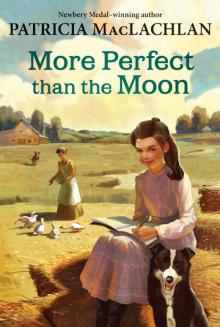 More Perfect Than the Moon
More Perfect Than the Moon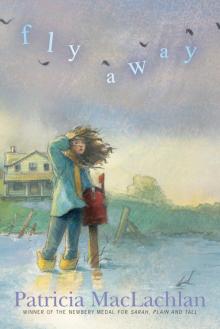 Fly Away
Fly Away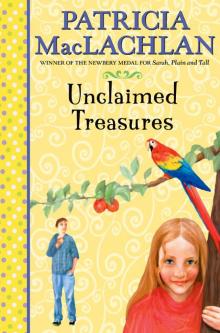 Unclaimed Treasures
Unclaimed Treasures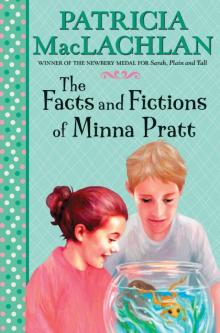 The Facts and Fictions of Minna Pratt
The Facts and Fictions of Minna Pratt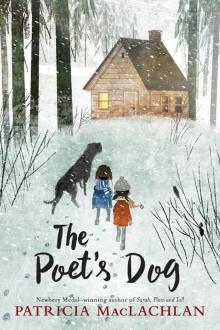 The Poet's Dog
The Poet's Dog Journey
Journey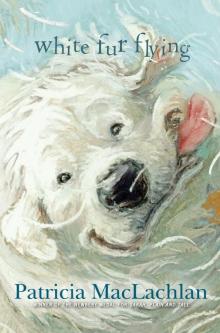 White Fur Flying
White Fur Flying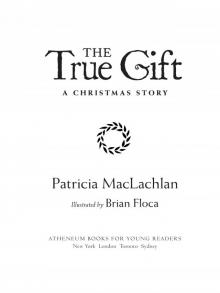 The True Gift: A Christmas Story
The True Gift: A Christmas Story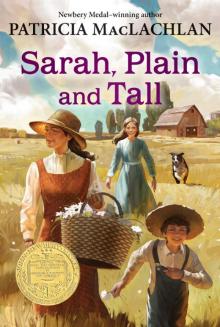 Sarah, Plain and Tall
Sarah, Plain and Tall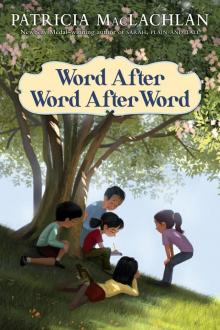 Word After Word After Word
Word After Word After Word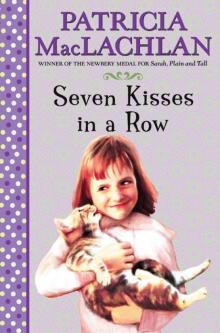 Seven Kisses in a Row
Seven Kisses in a Row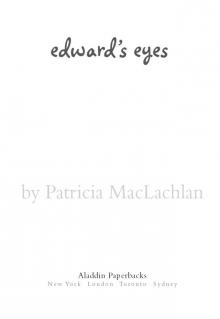 Edward's Eyes
Edward's Eyes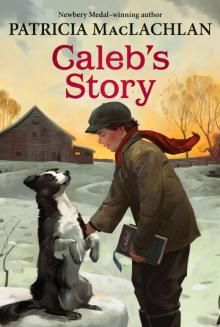 Caleb's Story
Caleb's Story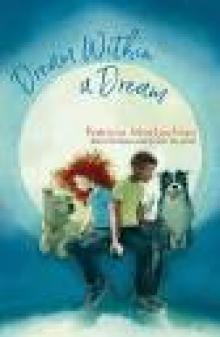 Dream Within a Dream
Dream Within a Dream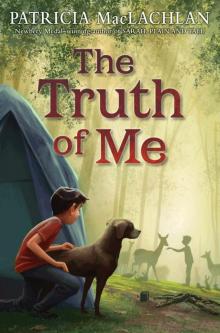 The Truth of Me
The Truth of Me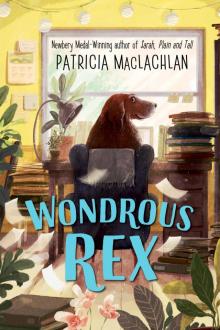 Wondrous Rex
Wondrous Rex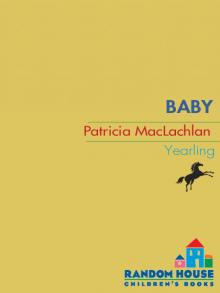 Baby
Baby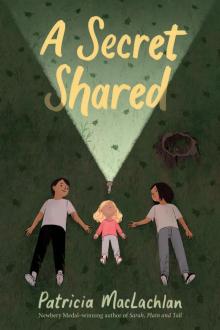 A Secret Shared
A Secret Shared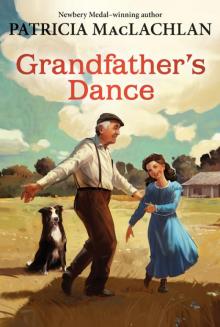 Grandfather's Dance
Grandfather's Dance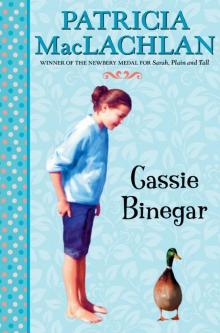 Cassie Binegar
Cassie Binegar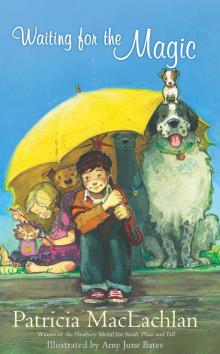 Waiting for the Magic
Waiting for the Magic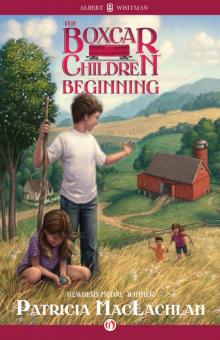 The Boxcar Children Beginning
The Boxcar Children Beginning My Father's Words
My Father's Words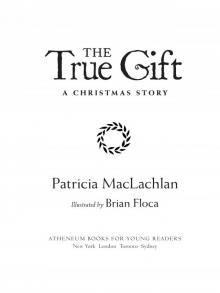 The True Gift
The True Gift